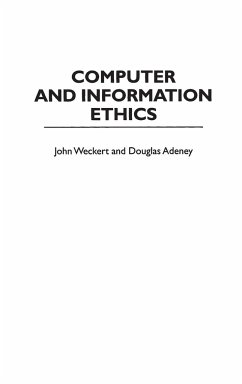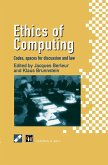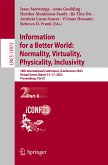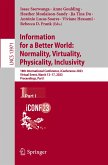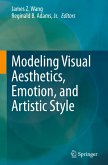Information technology has provided numerous options to individuals, governments, and corporations around the world. These options demand that choices be made, and such choices often involve ethical decisions. Users must decide, for example, whether certain data should be made available on the Internet, whether the information contained in various databases should be sold to third parties, and whether software developers should be held responsible for social and economic problems that result from their programs. This book provides a rigorous but accessible discussion of some of the major ethical issues concerning computers and information technology. The text gives particular attention to widespread issues concerning intellectual property rights, censorship, and privacy, along with less frequently raised topics, such as ethical worries about image manipulation, virtual reality, and the moral status of intelligent machines and expert systems. Computers and information technology have created numerous options for their users. Individuals, governments, and corporations around the world must decide whether a particular technology or application should be used, how it should be employed, and toward what end. Sometimes such decisions may be based on purely economic or personal considerations. For example, a user might feel more comfortable with a particular word processing software, and a company might decide that a particular spreadsheet package meets all of its needs at a lower cost than competing products. But decisions concerning computer and information technology also involve ethical issues. Companies must determine whether it is an ethically correct objective to save money by replacing workers with technology. Courts and governments must decide whether it is ethical to censor communication on the Internet, or require software developers to have liability for social ills caused by use of their products, or for corporations to collect and sell information about individuals and their habits. This volume provides a rigorous but accessible philosophical examination of ethical issues related to computers as information processing machines. Special attention is given to questions of intellectual property, censorship, and privacy, for these issues are continually raised in the popular press and are central ethical concerns. But the book also considers ethical worries about image manipulation, virtual reality, the use of expert systems, and the moral status of intelligent machines. Some of the moral questions discussed have not yet arisen in practical situations, but these issues should be examined before they become urgent. While many issues have been omitted, the examinations within the text help show how additional ethical concerns may be approached in the future.
Hinweis: Dieser Artikel kann nur an eine deutsche Lieferadresse ausgeliefert werden.
Hinweis: Dieser Artikel kann nur an eine deutsche Lieferadresse ausgeliefert werden.

